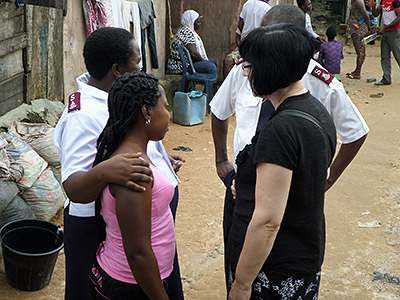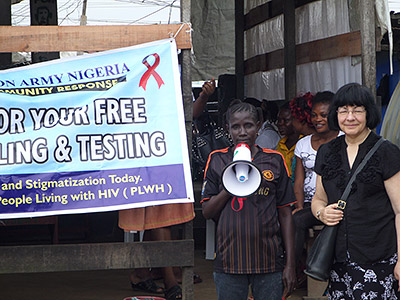Nigeria
The Community HIV & AIDS Integrated Response (CHAIR) Project run by The Salvation Army in Lagos, Africa’s most populous city and Nigeria’s commercial center, serves six of its poorest communities. These include the Ijora informal settlement – a jumble of tiny shacks crowded together and built on stilts over a trash-filled swamp, housing migrants from around West Africa. Prostitution and drug abuse abound here, putting the residents at high risk of contracting HIV.
Worldwide, Nigeria has the second highest number of new HIV infections reported each year, and an estimated 3.7 percent of the population are living with HIV, according to UNAIDS. Lagos State, in particular, has experienced an increase in HIV/AIDS infections and insufficient response to the need.
In spite of these challenges, the Ijora community’s spirit is strong. This was evident when Salvation Army staff and officers – sponsored by The Salvation Army World Service Office (SAWSO) – conducted a day of outreach education and HIV counseling and testing. Using the small structure with wood plank and tarp walls that serves as a community center as its base, the team invited the slum’s residents to come for HIV tests.
Testing is a major component of SAWSO’s CHAIR project, which aims to reduce the rate of new infections, provide care and support for those infected and affected with HIV, and to reduce stigmatization and discrimination in Lagos State through advocacy and raising awareness.
CHAIR also trains community leaders and other key individuals to address stigmatization and encourage positive thinking – a component that supports SAWSO’s commitment to creating sustainable communities where members are personally active in improving quality of life.
An Ijora resident, a diminutive middle-aged lady, had completed CHAIR’s two-day training for volunteer community mobilizers just the day before. The team was concerned because she had been so quiet during the training. She seemed reluctant to interact with other trainees and appeared to have trouble understanding the information being taught.
But in her own community, she was transformed. Megaphone in hand, she headed the team’s small parade through the settlement, calling out for her neighbors to come for testing. The warmth with which she was received – and the response – were impressive. The staff received a constant stream of community members requesting HIV testing and counseling, while the others chatted with families in the waiting area.
Those who tested positive were referred to government health services for treatment and could join the Salvation Army’s support group for people living with HIV. Those who were negative left reassured and with information on how to protect themselves.
Thanks to supporters, SAWSO is engaged in the global fight against HIV. Entrenched at the heart of local communities, the CHAIR project is equipping communities with knowledge and resources, empowering residents to take action, and restoring peace in the hearts and households of those who are served.


